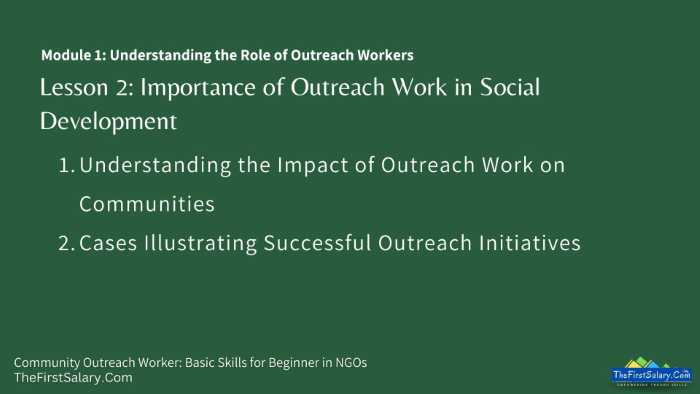
Module 1: Understanding the Role of Outreach Workers
Lesson 2: Importance of Outreach Work in Social Development
This lesson explores the importance of outreach work in supporting social development and building healthier, more resilient communities. We’ll look at how outreach workers positively impact communities and examine real-life examples of successful outreach initiatives across various sectors.
Key Concepts
• Understanding the Impact of Outreach Work on Communities
• Cases Illustrating Successful Outreach Initiatives
1. Understanding the Impact of Outreach Work on Communities
Outreach work is essential for promoting positive change in communities, addressing various social issues, and helping individuals achieve healthier and more stable lives. By engaging directly with people, outreach workers gain insights into unique community challenges—like limited healthcare access, educational barriers, and economic struggles. This connection enables targeted solutions that address these immediate issues while building long-term community resilience.
Typical outreach activities include organizing health camps, educational workshops, or programs aimed at economic empowerment, each tailored to the needs of a specific community. By working closely with community members, outreach workers not only provide short-term relief but also build trust and foster a collaborative spirit, laying a strong foundation for sustainable development and social harmony.
2. Cases Illustrating Successful Outreach Initiatives
Outreach efforts have led to significant positive changes worldwide. Here are a few examples that highlight the impact of successful outreach initiatives:
| Sector | Outreach Initiative | Results |
|---|---|---|
| » Healthcare | Outreach workers collaborated with rural clinics to bring healthcare services to remote communities, offering vaccinations, maternal health support, and preventive screenings. | Improved health outcomes, decreased mortality rates, and increased community awareness of preventive care. |
| » Education | Programs for marginalized children provided tutoring, school supplies, and scholarships to improve school attendance and learning. | Increased school enrollment, enhanced academic performance, and boosted children’s confidence in pursuing education despite financial hardships. |
| » Women’s Empowerment | In urban slums, outreach workers organized skill-building workshops for women, teaching them trades like tailoring, handicrafts, and small business management. | Women gained financial independence, contributed to family income, and achieved higher community standing and self-esteem. |
| » Environmental Awareness | Outreach campaigns educated communities about waste management, water conservation, and sustainable farming practices. | Cleaner environments, reduced pollution, and stronger community responsibility towards natural resources. |
» Practical Application
Outreach work is adaptable and can be applied to various areas like healthcare, education, and environmental awareness, improving lives and empowering communities. For example, healthcare outreach workers may organize vaccination drives in rural villages, while education outreach workers assist families in securing school resources for their children. Each initiative directly addresses a specific need, creating meaningful improvements.
Steps to Apply:
- Identify Community Needs: Recognize specific issues like health gaps, education barriers, or environmental concerns in the target community.
- Collaborate with Local Organizations: Partner with local health centers, schools, or environmental groups to expand outreach capacity.
- Develop Tailored Programs: Create programs that align with community needs, such as health workshops, scholarship programs, or eco-friendly campaigns.
- Track Progress and Impact: Monitor the outcomes of these initiatives to ensure they are effective and make adjustments as needed.
» Practical Tasks
Imagine you’re an outreach worker tasked with increasing school enrollment in a low-income area. Your objectives include:
• Identifying educational challenges: Speak with families to understand why children are not attending school.
• Providing support: Share information about scholarships and distribute school supplies.
• Organizing an enrollment drive: Host a community event with local schools to facilitate easy enrollment.
» Example
Consider a case in a rural village where an outreach team discovered that many children lacked access to quality education due to economic hardships. By providing tutoring sessions and scholarships, the outreach workers helped these children enroll in school, greatly improving their learning outcomes.
Question
1: What was the primary focus of the outreach team in this example?
The focus was to improve access to education for children facing financial difficulties.
2: How did the outreach workers support the children’s education?
They provided tutoring and financial support, enabling children to attend school.
» Common Mistakes
• Lack of Community Involvement: Outreach programs are more effective when communities are actively involved. Always seek input from community members to understand their real needs.
• Overlooking Follow-Up: Initial engagement is crucial, but follow-up is equally important to ensure long-term success and adapt to changing needs.
• Using Technical Language: Avoid complex terms that community members may not understand; keep language simple and clear to ensure accessibility.
» Summary
Outreach work significantly contributes to social development by addressing pressing community needs and empowering individuals to improve their lives. Successful initiatives across healthcare, education, women’s empowerment, and environmental awareness demonstrate the potential of outreach work to create long-lasting positive impacts on communities.
» Takeaways
• Outreach work addresses specific community needs, fostering sustainable development.
• Effective outreach requires community involvement and clear, accessible communication.
• The success of outreach initiatives relies on follow-ups and adapting to changing needs.
» FAQs
What is the purpose of outreach work?
Outreach work aims to address community needs by providing resources, information, and support directly to individuals and groups, promoting social and economic well-being.
How does outreach work support social development?
By focusing on underserved populations, outreach workers help improve access to essential services like healthcare, education, and employment, driving inclusive development.
What are some examples of outreach initiatives?
Examples include healthcare camps in rural areas, tutoring programs for marginalized children, skill-building workshops for women, and environmental awareness campaigns.
Why is community involvement important in outreach work?
Involving the community ensures that programs align with real needs, improving the likelihood of success and fostering a sense of ownership and engagement.
How do outreach workers track the impact of their work?
Outreach workers keep records, gather feedback, and monitor progress to measure the effectiveness of their initiatives and make necessary improvements.
